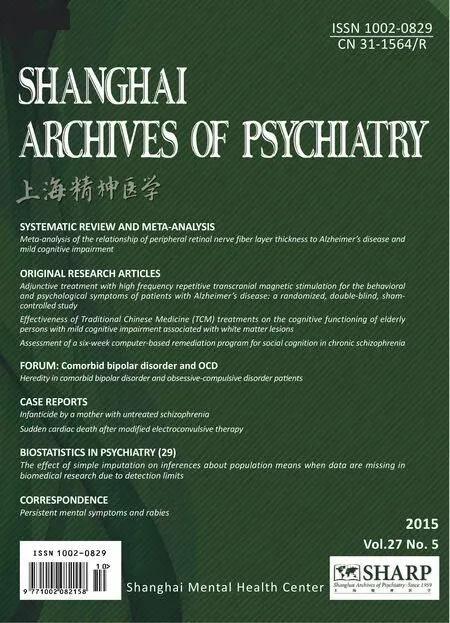Persistent mental symptoms and rabies
2015-12-08HasanTahsinGOZDASMustafaHATIPOGLU
Hasan Tahsin GOZDAS*, Mustafa HATIPOGLU
[Shanghai Arch Psychiatry. 2015; 27(5): 326-327. doi: http://dx.doi.org/10.11919/j.issn.1002-0829.215049]
•Correspondence•
Persistent mental symptoms and rabies
Hasan Tahsin GOZDAS1,*, Mustafa HATIPOGLU2
[Shanghai Arch Psychiatry. 2015; 27(5): 326-327. doi: http://dx.doi.org/10.11919/j.issn.1002-0829.215049]
We read the case report by Wang and colleagues[1]with great interest. The authors linked persistent mental symptoms of the patient with rabies encephalitis.However, we think that the points listed below should be explained more clearly before this diagnosis can be confirmed.
1) The incubation period of rabies is only three days. It was not mentioned which body part was bitten by the dog. If the bite was close to the central nervous system, it would be especially important for development of rabies.We think that the bite could be a coincidental event unrelated to the subsequent mental symptoms.
2) Is there any knowledge about the dog’s last status? It is important to know whether the dog was rabid or not.
3) Which method was used to investigate rabies immunoglobulin in the cerebrospinal fluid?What were the patient’s other cerebrospinal fl uid findings? For instance, was herpes simplex virus encephalitis investigated? This would be important to know because this is another possible explanation of the condition.
4) It is well known that rabies is almost always fatal, but this patient survived. Which factors might have resulted in the patient’s survival in the presence of severe persistent mental symptoms due to rabies encephalitis?
Information on these points will help to clarify the probable cause of the mental symptoms in this patient.
Funding
None
Conflict of interest statement
The authors declare no conflict of interest related to this manuscript
1. Wang X, Yu X, Guan Y. Case report of rabies-induced persistent mental symptoms.Shanghai Arch Psychiatry.2015; 27(1): 52-54. doi: http://dx.doi.org/10.11919/j.issn.1002-0829.214174
(received, 2015-04-20; accepted, 2015-06-10)

Dr. Gozdas obtained his MD degree in 2008 from Cerrahpasa School of Medicine in Istanbul University and an MD (in Infectious Diseases and Clinical Microbiology) in 2014 from the School of Medicine at Sakarya University. He is currently working as a specialist doctor in the Department of Infectious Diseases and Clinical Microbiology at Kastamonu State Hospital. His research interests are antibody response to rabies vaccination, central nervous system infections and critical care medicine.
Dr. Wang responds
We thank Drs. Gozdas and Hatipoglu for their comments on our case report.
The patient had been bitten on the back of the hip while using a squat toilet so the bite was near the base of the spine. This location is consistent with a rapid onset of symptoms. Unfortunately, no information was obtained about the dog at the time; wild dogs are not unusual in some parts of rural China.
The rabies antibody was identified using an enzyme-linked immunosorbent assay (ELISA) which is a standard method for confirming the rabies diagnosis. There were no other abnormal findings in the cerebrospinal fl uid findings, but the herpes simplex virus was not assessed, so this possibility cannot be definitively excluded.
The patient was a healthy young man prior to the dog bite which occurred 6 years before he presented to our hospital. He was given antipyretics 3 days after the bite at a local rural hospital; we expect, but cannot confirm, that he was also given glucocorticoids at thistime. If that is the case, this may have suppressed the inflammatory response until he got to the tertiary hospital (1 month later) where he was given antiviral treatment. This may help explain why the rabies infection was not fatal.
Given the close association of the dog bite with the onset of symptoms and the confirmation of rabies infection using ELISA, we conclude that the cerebral atrophy identified on MRI and the associated psychological symptoms are most probably the residual effects of rabies encephalitis.
Xiaoqing Wang
Changhai Hospital Shanghai Second Military Medical University Shanghai, China
[Author’s disclosure statement is in the original article.]
(received, 2015-09-15; accepted, 2015-10-13)
1Department of Infectious Diseases and Clinical Microbiology, Dr. Münif İslamoğlu Kastamonu State Hospital, Kastamonu, Turkey
2Department of Infectious Diseases and Clinical Microbiology, Çanakkale Military Hospital, Çanakkale, Turkey
*correspondence: dr.htgozdas@yahoo.com.tr
A full-text Chinese translation of this article will be available at http://dx.doi.org/10.11919/j.issn.1002-0829.215049 on February 26, 2016.
杂志排行
上海精神医学的其它文章
- Sudden cardiac death after modified electroconvulsive therapy
- Infanticide by a mother with untreated schizophrenia
- The effect of simple imputation on inferences about population means when data are missing in biomedical research due to detection limits
- Assessment of a six-week computer-based remediation program for social cognition in chronic schizophrenia
- Heredity in comorbid bipolar disorder and obsessive-compulsive disorder patients
- Effectiveness of Traditional Chinese Medicine (TCM) treatments on the cognitive functioning of elderly persons with mild cognitive impairment associated with white matter lesions
